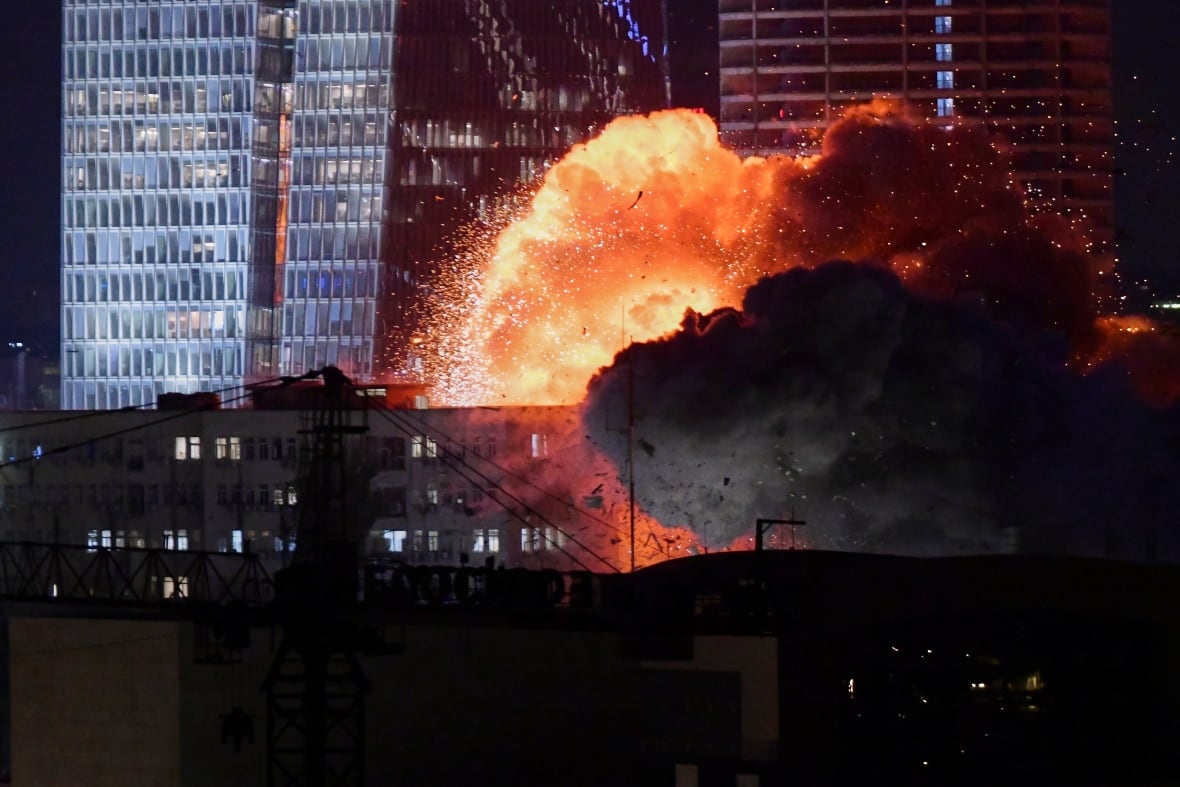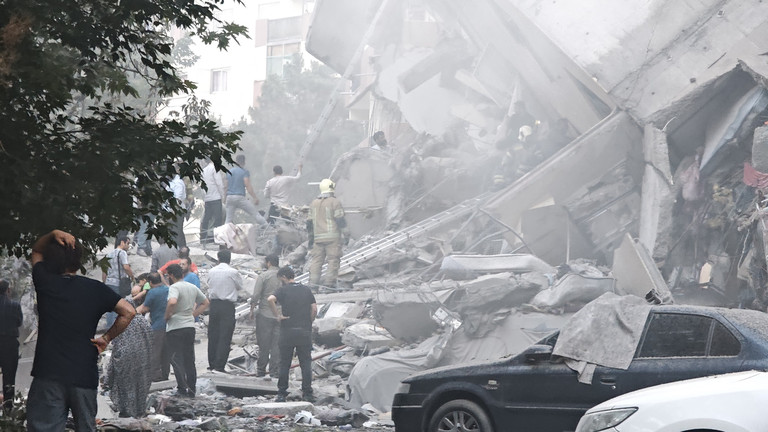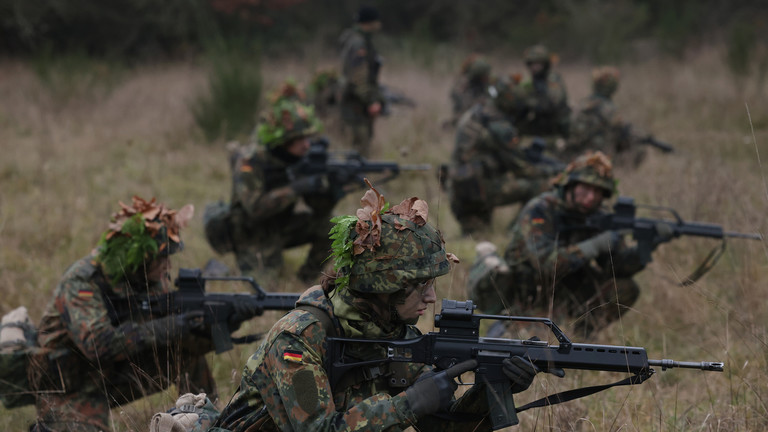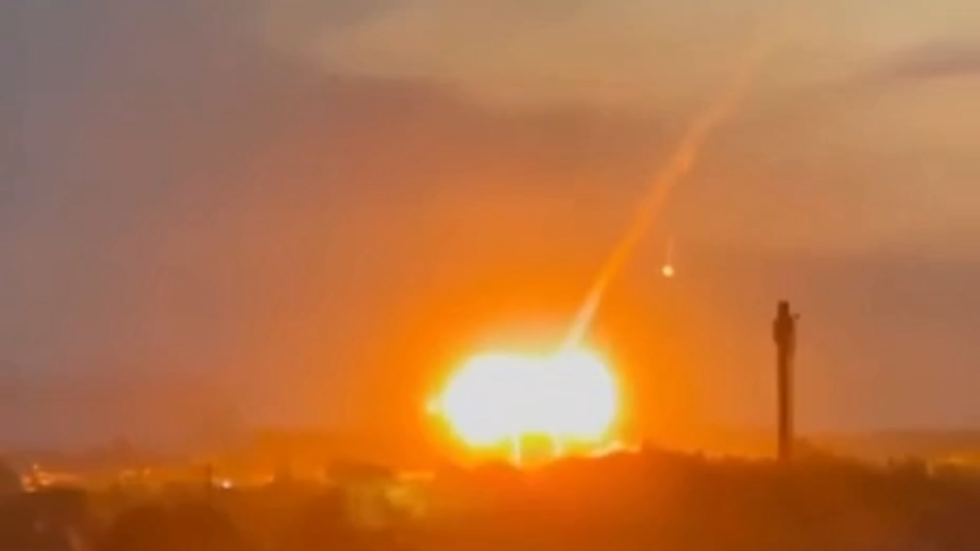The Russians’new enemy 1 is not the US
FILE PHOTO: Soldiers of the Bundeswehr, the German armed forces, during basic training. ©Sean Gallup/Getty Image
By Tarik Cyril Amar, a historian from Germany working at Koç University, Istanbul, on Russia, Ukraine, and Eastern Europe, the history of World War II, the cultural Cold War, and the politics of memory
They probably won’t but Germans should pay close attention to a recent news item out of Russia: The Levada polling institute – long internationally acknowledged as serious and dependable – has published the result of a recent survey. It shows that Germany is now considered peak hostile by ordinary Russians: 55% of them name Germany as the country most unfriendly toward Russia.
Five years ago, that figure stood at 40%. That was no small number either, but two things stand out now: First, the rapid increase in Germany’s un-favorability rating and, second, the fact that Berlin has managed to take over the top position in this dismal ranking: For 20 years it was securely held by the US, which still came in at a whopping 76% as recently as last year.
But now, clearly responding to Trump’s new, comparatively more rational course toward Moscow, “only” 40% of Russians see the US as the most unfriendly state. To paraphrase an old Soviet motto: Berlin has caught up with and overtaken America.
Many Germans, especially in the political, mainstream media, and conformist ’expert’ elites will either completely ignore or dismiss this shift. Others will even be foolish enough to feel pleased: What better evidence that the new German bellicism has left an impression?
For a historian – or really anyone with a memory – the Levada finding should be alarming. To see why, we need a broader context. The thing about Germany is that, sooner or later, the question of war or peace – at least in Europe or even the world – depends on it, whatever usually unoriginal ideas its elites get worked up about at any given time.
Maybe that special combustibility is due to a deep mismatch between Germany’s resources and location, on one side, and its geopolitical environment, on the other, as Henry Kissinger used to quip. Perhaps the explanation is less forgiving and has to do with a failing political culture shaped by persistent habits of shortsightedness and misguided ambitions.
In any case, in about 1945, after the second global war caused by Berlin in much less than half a century, everyone who mattered – not the Germans anymore at that point – seemed to understand that one large Germany can be, let’s say, awkward for the rest of the world. Two seemed about right, especially when both were under firm control, from Washington and Moscow, respectively.
The other thing generally accepted was that the old enmity between Germany and France had to be buried. A third crucial issue, however, was not only left unresolved but instead weaponized for Cold War purposes: if Germans had to finally play nice with the French and other West Europeans in general, the US needed its Germany to stay nasty toward the Russians, that is, at the time, the Soviets.
In effect, West Germany was re-trained to come to heel toward the West but keep barring its teeth toward the East. The polite term for this act of national house-training in Western “values,” “civilization,” and, last but not least, geopolitical hierarchies is “the long way West.”
Fortunately, from the 1970s and through the unexpected yet quietly earthshaking advent of German unification (de facto West Germany annexing East Germany with Soviet, i.e., Russian permission), the deterrent logic of the Cold War and a fundamentally wise “Ostpolitik” mitigated that teeth-baring a little. But now that policy has not merely been abandoned but anesthetized.
Today, even wanting to talk to “the Russians” to convey anything other than ultimatums is smeared as “appeasement.” Former representatives of normal engagement are either forced into humiliating public recantations (for instance, President – no less – Frank-Walter Steinmeier) or ostracized (the once tone-setting journalist Gabriele Krone-Schmalz, for example). The worst sin in the new old German catechism is to even try to “understand” Russia, literally: A “Russlandversteher” is a heretic almost worthy of the stake now.
Such heretics are clearly in the way of a new course – taken by all mainstream parties – that starts from the assumption that Germany and Russia must always be enemies, as current Foreign Minister Johann Wadephul recently stated in an unguarded and therefore honest moment.
Consequently, the only policy that seems to be left to such hidebound minds is to build up the military and massively increase armament spending. That such spending has already been practiced and has a miserable record of inefficiency in Europe, as even the Financial Times admits, does not matter to them. Neither will it, of course, to the arms industry and its shareholders.
And perish the thought that Germans could be smart enough to do both: (sensibly) modernize their military and, at the same time, engage in genuine talks and compromise – as well as renewed, mutually beneficial commerce, too – with Russia. That pattern – not dumb “appeasement” – after all, was the real signature style of the cheaply maligned “Ostpolitik.” But it seems that this ability to walk and chew gum, as Berlin’s former American idol Joe Biden would have said, has been lost, or, perhaps, willfully abandoned.
With the urge to splurge on weapons comes a clearly coordinated propaganda campaign as not seen since the early 1980s (at best): German politicians, generals, mainstream media, and conformist “experts” have been unleashing a torrent, a veritable “Trommelfeuer” of war hysteria on the German public.
Professors of ancient history – noticing unintentional irony has never been a German forte – are explaining again that parents must be ready to sacrifice their offspring in war. Dulce et decorum est pro patria mori, and so on… As if the First World War had never been lost.
The German military’s top general can’t quite make up his mind if Russia will attack in a few years or maybe tomorrow. And one TV talk show and documentary after the other is dedicated to the need for “war proficiency” (in the original German “Kriegstüchtigkeit,” a term with an untranslatably traditional ring to it, in a bad way).
Finally, we have Friedrich Merz, a German chancellor with a flimsy mandate who clearly believes that it is his historic task to be even more bellicose than the Americans and take over their role in NATO Europe if necessary.
The irony of a vassal government finally finding a spine just to be even more ideologically immobile than even its changing hegemon is not new in recent German history. That is, after all, how Erich Honecker, the last (relevant) leader of the former East Germany, chose to go out: by demonstratively snubbing Moscow’s thaw with the West. In a similar spirit, Merz insists on continuing the proxy war in Ukraine and makes a point of not wanting the Nord Stream pipelines repaired, even while Russian and US investors (close to Trump, as it happens) are talking about precisely that.
Merz has just been to see Trump in Washington. And mainstream media reporting on their encounter is unintentionally revealing of just how little he has achieved. In essence, the German chancellor is being praised for not having been brutally humiliated by Trump. Indeed, Merz was spared the fate of Vladimir Zelensky of Ukraine – and that is the best that can be said.
Let’s set aside that, actually, Trump did haze his guest, if comparatively mildly, teasing him about Germany’s not-so-great experience of D-Day 1944 and offering condescending congratulations on his English. It was the kind of affability that Trump the former reality show host would have displayed toward an “apprentice” currently in favor.
What is more substantial is that Merz was not given one inch on any topic he cares about: Regarding NATO, US-European trade, and the Ukraine War, the German chancellor got precisely nothing. On the contrary, Trump has already made sure to signal how absolutely unimpressed he is by whatever Merz may have had to say, when not modestly silent: On Ukraine, Trump has publicly conceded that Kiev’s recent sneak drone attack gives Russia the right to massively retaliate. On trade, Trump has increased the pressure again with steel and aluminum tariffs that will hit the EU and Germany hard.
What a world Germany has made for itself: It has the US, a hegemon and “ally” that first either blows up or is involved in blowing up its vital-infrastructure pipelines and then gets ready to take over and repair the ruins to have even more power over Berlin. With Zelensky’s Ukraine, it has a very expensive, very corrupt client that even the Germans now admit was involved in the same terrorist attack on Nord Stream.
Germany’s economy, meanwhile, would greatly benefit from re-establishing a reasonable relationship with Russia. But Berlin’s only strategy regarding Moscow is prolonged confrontation, an extremely costly armament program, and war hysteria so intense it makes it look as if German elites are not-so-secretly longing for yet another devastating clash with Russia.
And by now, Russians have taken notice, not only within the elite but the general population. Good luck, Berlin: You’ve poked the bear long enough to get his attention. Again.








